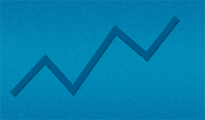The performance of the Metal Engineering Division in 2015/16 was characterized by a sustained favorable environment in its most important market segment, railway infrastructure. The fact that the (adjusted) earnings figures were ultimately lower than those of previous years is largely due to the dramatic deterioration of the market environment for oil and natural gas in the course of the year. As a result of both market- and cost-based measures that were taken promptly, the decline of the operating result was kept at a manageable level and steel capacity at the site in Donawitz, Austria, was largely fully utilized throughout the entire business year 2015/16.
In the Rail Technology business segment, the trend on the European market was particularly gratifying. As a result both production and delivery volume of high quality rail grades reached a new record level in the business year 2015/16. In contrast, the overseas railway projects, especially in the heavy-haul transport market, experienced comparatively weak demand, especially from the mining sector, for the first time in years. The commissioning of a new walking beam furnace in the fourth quarter of the business year 2015/16 was another step toward an additional increase in productivity and quality in the Rail Technology business segment.
The Turnout Systems business segment can look back the most successful business year in its history. This enabled the division to not only compensate for the weakness in demand from the mining sector but to emphasize its position as the global leading provider of turnout systems due to further growth in both the high-speed and mass transit segments. Viewed regionally, the Turnout Systems business segment benefited from continuing demand from the USA for turnouts for urban use, while demand from the heavy-haul transport segment softened noticeably in the course of the year. On one hand, this decline has structural reasons (reduction of the transport volume of coal for power plants due to the shift to natural gas-powered power plants) and economic reasons on the other (reduced transports of raw materials, e.g., oil, ore, coal, equipment). Declining raw materials transports due to economic listlessness are also the reason for reduced investment in railway infrastructure in Australia, Brazil, and South Africa. In China, extensive investments in the expansion of the high-speed network continued, resulting in a sustained solid trend, while in India, bureaucratic obstacles led to project delays. As far as Europe is concerned, the Turnout Systems business segment benefited from extensive investments in the maintenance and expansion of the railway network.
In the Wire Technology business segment, the cornerstone was the momentum in demand from the automotive industry in the business year 2015/16. In contrast, incoming orders from the construction and mechanical engineering segments were subdued. The run-up phase for production of ultra-high-tensile fine wire at a new plant in Fürstenfeld, Austria, is going well, especially due to increasing customer demand from the revitalized photovoltaics industry. The Italian wire processing company Trafilerie Industriali S.p.A., which was acquired in the previous year, has been successfully integrated into the Wire Technology business segment. In 2016/17, the focus of the business segment will be on the completion of the commissioning process of the new wire rolling mill in Donawitz, Austria.
In the business year just ended, Seamless Tubes, the business segment in the voestalpine Group that has most exposure to the current weakness of the oil and natural gas industries, faced a significant decline in incoming orders, especially due to the deterioration of its most important market North America. While oil exploration activities in the USA were at a historically low level, demand from the Middle East remained relatively satisfactory, although price competition was fierce. Comprehensive cost reduction measures, including personnel adjustments, but also new, innovative product solutions to increase productivity in oil and natural gas production were the most important countermeasures taken to cushion the precarious market trend.
The Welding Consumables business segment faced a continuing weak market in 2015/16—as had been the case in previous years, especially in the European energy engineering and power plant construction market. Viewed regionally, market conditions remained very challenging in Europe and particularly in China and Brazil. The optimization measures launched in the business year 2013/14 should produce a substantial operational improvement in this business segment by 2016/17, despite continuing weak demand in its core markets.

Share page